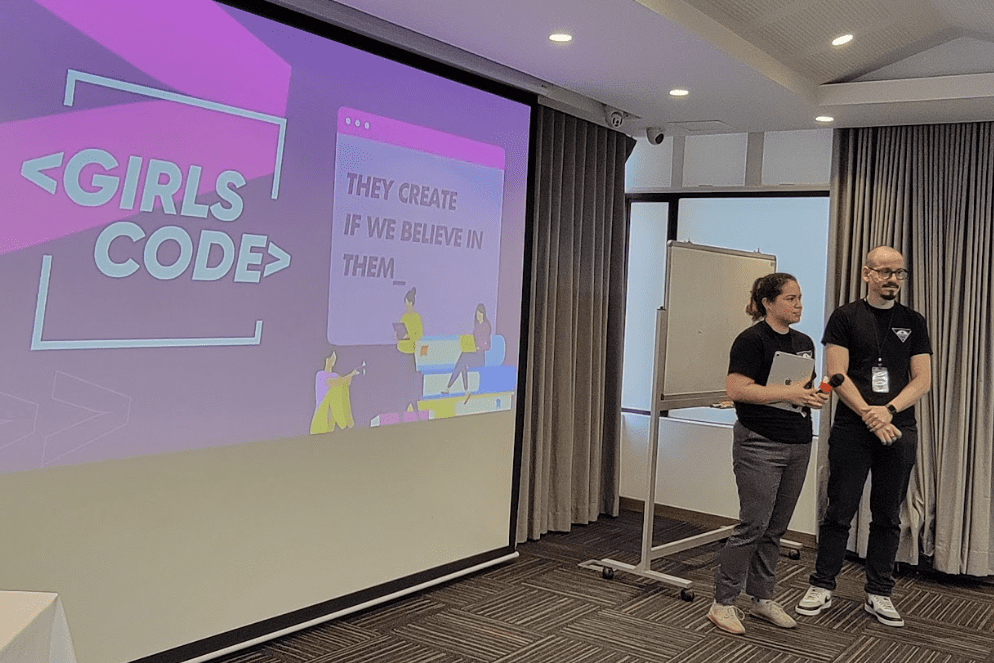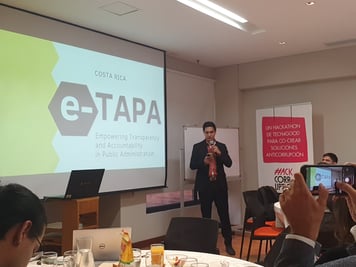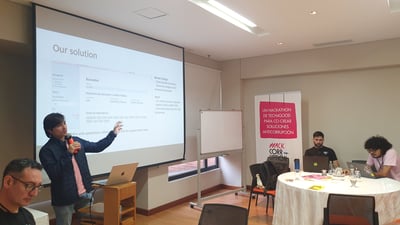NEWS
August 24, 2023

IN BRIEF
HackCorruption, our corruption-fighting series of hackathons, has wrapped in Bogotá, Colombia, with 20 teams taking to the pitch stage. Ideas ranged from digital procurement portals to beneficial ownership applications and citizen monitoring systems. Our panel of judges is currently assessing the solutions and we look forward to announcing our winners next week. Accountability Lab hosted the third HackCorruption event in Colombia, following the first event in South Africa and the second in Nepal. The proogram supports talented individuals from the civic tech, CSO, and activist arenas, to build innovative solutions to combat corruption. The hackathon is supported by the Bureau [...]
SHARE
HackCorruption, our corruption-fighting series of hackathons, has wrapped in Bogotá, Colombia, with 20 teams taking to the pitch stage. Ideas ranged from digital procurement portals to beneficial ownership applications and citizen monitoring systems. Our panel of judges is currently assessing the solutions and we look forward to announcing our winners next week.
Accountability Lab hosted the third HackCorruption event in Colombia, following the first event in South Africa and the second in Nepal. The proogram supports talented individuals from the civic tech, CSO, and activist arenas, to build innovative solutions to combat corruption. The hackathon is supported by the Bureau of International Narcotics and Law Enforcement at the U.S. Department of State and the USAID Countering Transnational Corruption Grand Challenge for Development, in partnership with the Center for International Private Enterprise and Development Gateway. Our Latin American regional hackathon invited 75 changemakers from Colombia, Panama, Costa Rica, Paraguay, Mexico and the Dominican Republic to work together. Seven winning teams with the most promising ideas will receive additional financial support of up to $10,000, mentorship, and ongoing training to help them build out their ideas. They will also participate in a 3-day intensive in-person boot camp in Colombia in October.
Read all about the innovative ideas below!
Team 1 – Daniela Medrano, Paula Alejandra
Budget and Ownership Transparency
Calculadora de impacto social: In Colombia, there are no methodologies for evaluating the social and economic well-being generated by investing in rural projects. In several sectors, there are no analytical tools to determine whether an investment project generates well-being for the country or not. Currently, investment decisions are not made in favor of social benefit but of individual benefits. Our model will look for a way to center social and economic integrity.
Team 2 – Lissette Pacheco, Luisaura Vargas
Budget and Ownership Transparency
Cifras Abiertas: Our project, “Cifras Abiertas,” is a budgetary transparency platform aimed at providing public and transparent access to financial and budgetary information of government entities. This platform seeks to promote accountability, citizen participation, and oversight of how public resources are managed.
Team 3 – Alexander Campos Sandoval , Jeanfreddy Gutiérrez Torres, Korina Sofía Quirós Solí, José Felipe Sarmiento Abell
Budget and Ownership Transparency
Aginet: Gathering transnational corporate data and unifying it in a single platform. We are combining different databases showing links to companies in different countries based on public procurement platforms, business registries and campaign financing in Central America.
Team 4 – Karen Aparicio, Esteban Felipe Cáceres Gelvez
Budget and Ownership Transparency
Caja Pública: A web application that allows users to access information about beneficial owners or state contracting at local and national levels in Colombia.
Team 5 – Luã Cruz, Leonardo Mario
Digital Citizenship to Constrain Corruption
SurveillanceMonitor: The solution aims to create a citizen monitoring system that addresses the lack of transparency and accountability in the acquisition and implementation processes of facial recognition technologies in Latin America. This uses public databases to identify and expose the actors involved. We will also look at transactions, companies, entrepreneurs, and manufacturers of facial recognition technologies. By incorporating responsible budget oversight, the solution will ensure that public funds are used appropriately.
Team 6 – Shirley Santana, Bryan Vásquez-Jiménez, Denny Cepeda Piña, Omar Ureña
Digital Citizenship to Constrain Corruption
DigitalBeans: This is the first citizen empowerment platform in the Dominican Republic focused on interactions between local government and cybercitizenship, inspired by the power of social networks and social participation devices. Our goal is for our Pedernales citizens to participate in real-time decision-making for their city, providing a secure space for public reporting. We will contribute to the first citizen participation index for the southern towns and the entire Dominican Republic.
Team 7 – Korina Sofía Quirós Solís, Rocio Alfaro, Israel Ortiz, Humberto José Perera Fonseca, Jose Pablo Arroyo Castro
Digital Citizenship to Constrain Corruption
e-TAPA: Our project is a segmentation strategy using social media, that is designed to engage the public through recommendation algorithms for information about purchases made with public resources, promoting their transparency and safeguarding.
Team 8 – Diego Acuña Picado, Jessica Bárcena, Maria Gabriela Fong, Maria Manuela Cordoba Aguirre, Ana Hurtado Pliego
Digital Citizenship to Constrain Corruption
Engage with your legislator: Access to parliament portals in our countries are cumbersome and it’s hard to find proposed bills or information about our legislators. Our project will promote citizen participation and engagement in the process of creating new bills or updating existing ones. It will also provide a way for legislators to monitor corruption.
Team 9 – Maria Elena Valencia Gonzalez, Cynthia Dehesa Guzman
Digital Citizenship to Constrain Corruption
Spaces: a solution for citizens to take care of municipal-owned property collectively. It will display cartographic data in a user-friendly fashion in order to locate municipal-owned properties.
Team 10 – Rodrigo Francisco Núñez Cárdenas, Grissel Rodríguez Roldán, Daniel Bustamante Lagart, Claudia Paulina Huerta De La Garza
Digital Citizenship to Constrain Corruption
MarIA: Imagine having a trustworthy companion that empowers you to report and prevent bribery involving officials, securely and anonymously? With MarIA, you can effortlessly share incidents, providing crucial information to combat corruption. Our cutting-edge AI technology ensures your privacy, safeguarding your identity while delivering impactful reports. MarIA: is designed to streamline the reporting process, eliminating the barriers that often deter people from taking a stand. By harnessing the power of WhatsApp, a platform accessible to millions, we’re making reporting corruption more convenient than ever.
Team 11 – Juan Alejandro García, Juan Felipe Pinto Castelblanco, Nicolas Calvo Tovar, Jhonatan Mauricio Quiñones Montiel
Digital Citizenship to Constrain Corruption
AquaCitizen: Education, technology and open government for the communitarian protection of the water. AquaCitizen is a smart, decentralized community model for water quality monitoring, to enable better decision-making at community, private, and public levels. Its scope encompasses both local scenarios and hydrological basins that cross national boundaries.
Team 12 – Juan Pablo Marin Diaz, David Enrique Daza Lacera, Juliana Galvis, Edda Forero, Laura Marcela Celis González
Open Contracting & Transparency of Public Procurement
Stalker de la contratación: IA chatbot for procurement transparency.
Team 13 – Julián Eduardo Mena Chávez, Jorge Alain Garcia Chavero, Karol Rocio Aguilar Badillo, Perla del Carmen García Loaeza
Open Contracting & Transparency of Public Procurement
We are presenting a web app that detects fake medication boxes. Our main objective is to contribute to transparency between the public and private sectors. Given that pharmaceutical crime is a major global public health issue, we will target the app at small pharmacies, public sector chemists and the general public.
Team 14 – Diana Infante Del Rio, Diana Infante Juan Bustos Adda Vargas
Open Contracting & Transparency of Public Procurement
A platform to display information about public works and infrastucture, it will provide a map of where the projects are being developed, enabling citizens to track the progress and report difficulties. It will also simplify some processes for public servants.
Team 15 – Liliana Estigarribia Franco, Gabriel Caroni Paiva
Open Contracting & Transparency of Public Procurement
GIRLS CODE’s – EQUILICITACIÓN: By analyzing data related to gender gaps in Paraguay’s public procurement processes, we discovered an absence of gender identification for business representatives supplying the state. This gap has the potential to affect gender equality, transparency, and decision-making. Our solution enhances transparency, detects biases, and supports anti-corruption efforts. “GIRLS CODE’s – EQUILICITACIÓN” empowers governments, public servants, businesses, and citizens to make informed decisions and promote gender equality in bidding processes.
Team 16 – Daniel Alejandro Valdés Amaro
Open Contracting & Transparency of Public Procurement
Ojo a las sanciones: +integridad: An open data mechanism to prevent contracts with irregular companies.
Team 17 – Isabela Granados Arocha, Mateo Restrepo Vera, Diego Santamarí, Jorge Umaña
Open Contracting & Transparency of Public Procurement
TodoLosContratos.lat: This is a tool that groups, analyzes and reviews data of public contracting in Colombia, Costa Rica and Panamá for the period 2020-2022. The instrument allows users to asses and weigh the risk associated with transnational corruption in Latin America based upon comparative indicators.
Team 18 – Gerand Ventura, Eva Sierra, Maximo Luis Domínguez Cueto
Open Contracting & Transparency of Public Procurement
Open Procurement National System: Our innovation will improve the Dominican Republic’s procurement platform. It seeks to make the entire procurement process transparent, from the internal phase to the post-contractual phase.
Team 19 – Cristian Sosa, Daniel Duque Lozano, Daniel Rojas, Yefry Nuñez, Dayanni Olivo Bogota
Open Contracting & Transparency of Public Procurement
Contractor: This solution seeks to increase transparency in the public procurement processes of Paraguay’s central and local government, by providing timely information to micro, small and medium enterprises (MSMEs), through a predictive natural language processing model using the fine-tuning of a BERT multilanguage transformer, based on historical values of similar tenders. This will help bidders to participate more efficiently in tenders and identify potential irregularities in the processes in which they participate in order to file more effective complaints.
Team 20 – Juan Pane, María Beatriz Vierci Codas, Rodrigo Villalba, Karen Riveros
Open Contracting & Transparency of Public Procurement
I-KEEP: Integrated Knowledge for Ensuring Ethical Procurement is a one-stop shop for decoding corruption data in public procurement. The platform is designed for citizens, journalists, researchers, and government decision-makers interested in analyzing information at a national and transnational level for signs of potential corruption and leveraging this analysis for subsequent actions. It is based on collaborative web-based knowledge graphs and an open platform based on open data, bridging data and information silos.












